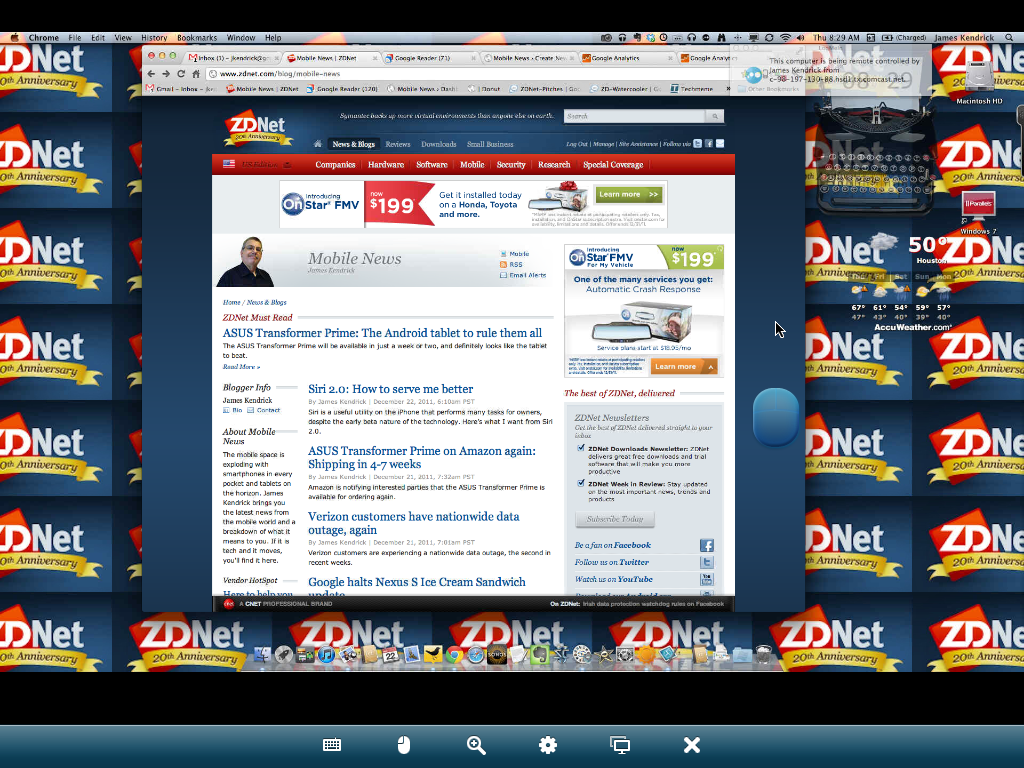Real work doesn't require Windows, but could benefit from it


See also: 5 reasons why Windows 8 will be dead on arrival; Why Windows 8 matters for real work, and so will Windows 9
Both Steven and David make excellent points and rather than rehash them I advise taking a few moments and reading each of the articles listed above. Steven's contention is that Windows is no longer needed for end users, and he's provided some valid arguments to support that premise. David's response is that real work, e. g. video editing, requires OS horsepower that only a real platform like Windows can provide. I agree with both guys, at least some of the points each present. But my real-world experience tells me that the conclusions they reach are no longer clear.
My experience as a practicing geophysicist for years is the basis for this response to the debate. I worked independently with big oil companies to generate 3D seismic images of the subsurface to help understand the complex layering of the Earth. This work involved complex data processing of billions of discrete data points using geophysical principles to make sure the resulting image was accurate.
To process these massive data volumes, huge clusters of Intel x86 processors were employed in parallel to work as super-computers. These clusters could consist of hundreds of thousands of CPUs working together to provide the massive computing power needed for such a big task. These clusters ran special software to do the seismic data processing, either running under Linux or Windows.
Teams of geophysicists/analysts worked together to guide this complex process which could take months even with such massive computing power. The teams would interact with the cluster through highly specialized software designed to control and inspect the complex process throughout the life of the project. These analysts used simple Windows PCs to do this, running a Citrix environment as a virtual window into the massive servers.
Basically the end user environment was a dumb client, simply a screen into this massive server environment. Even though these analysts were controlling a tremendous process, a very expensive one at that, they were not using a complex computer to do so. The terminals were just that, a thin client.
These clients ran either Linux or Windows, it didn't matter which. They simply logged into the big server where everything happened in real-time. This is significant to this Windows 8 debate because there is no work that could be considered "real work" as David mentions more than this seismic imaging. And he is right, a real OS on the server is mandatory to control such heavy computational lifting. But that is just on the server.
The end users in this example using thin clients don't need a real OS, Windows or otherwise, to function just fine. Any mobile OS with the proper virtual machine environment can tap into any complex system, and gain the benefit or doing it from anywhere. In my geophysical career, I tested such a setup using a touch tablet and the benefits of adding portability and touch control were immense. I didn't need Windows to do this, either. So I think with proper cloud environments David's assertion that real platforms are required to do real work is not accurate, at least not on the end-user side of the equation.
There are already good virtual machine applications for Android and iOS to allow tapping into more powerful computers from mobile devices as needed. I suspect they will be brought over to Windows 8, hopefully the ARM version, to allow any mobile device running Windows 8 to tap into any cloud-based system, even those running full Windows (not mobile version).
Now before Steven can start gloating, I have to put forth that I am extremely excited by the prospect of Windows 8 on ARM mobile systems. I can see them bringing a level of sophistication to the example above by leveraging Windows on the thin client side, amping the mobile client up a notch to add further capability on the end-user side. This could bring the ability of running local apps specially created to perform specific tasks, while retaining the ability to tap remotely into the super computer environment described. A level of processing power never seen before could be implemented with Windows 8 on ARM devices, and this has me giddy at the implications.
So I am not waffling as I both agree and disagree with Steven and David in this debate that Windows 8 is/isn't going to do well. I do agree that the advance of the mobile OS in recent years makes Windows less necessary for lots of things, but I see specific things Windows 8 brings to the mobile table that might offset that for some uses. Like many things in the mobile space this isn't cut-and-dried, rather it will continue evolving in ways we can't predict.
Related coverage:
- iPad 2 as serious writing machine (how-to)
- ASUS Transformer Prime: The Android tablet to rule them all
- Color me surprised. I am 90 percent post-PC
- iPad 2 keyboard case shootout
- Logitech fold-up keyboard for iPad 2: Full-sized, full featured (review)
- Why I bought an iPad 2
- HP TouchPad: Everything you want to know
- Review: Motorola XOOM, brimming with unrealized potential
- Hands-on review: Samsung Galaxy Tab 10.1
- Hands on with first 7-inch Honeycomb tablet: Acer A100
- Lenovo IdeaPad K1 tablet: First impressions
- ThinkPad Tablet: Ready for the boardroom
- ThinkPad Tablet vs. Samsung Galaxy Tab 10.1 as laptop replacement